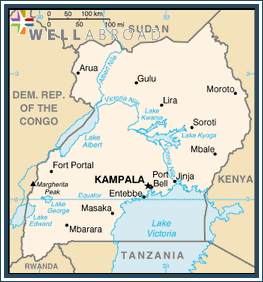|
MOST RECENT ALERTS
There's no recent alert.
|

|
|||||||||||||||
| COUNTRY OVERVIEW | ||||||||||||||||
|---|---|---|---|---|---|---|---|---|---|---|---|---|---|---|---|---|
|
| COUNTRY GENERAL INFORMATION | |||||||
|---|---|---|---|---|---|---|---|
| Language: |
English (official national language, taught in grade schools, used in courts of law and by most newspapers and some radio broadcasts), Ganda or Luganda (most widely used of the Niger-Congo languages, preferred for native language publications in the capital and may be taught in school), other Niger-Congo languages, Nilo-Saharan languages, Swahili, Arabic |
||||||
| Currency: | Ugandan Shilling (UGX) | ||||||
| Predominant Religions: |
Roman Catholic 41.9%, Protestant 42% (Anglican 35.9%, Pentecostal 4.6%, Seventh Day Adventist 1.5%), Muslim 12.1%, other 3.1%, none 0.9% |
||||||
| National Holidays: | Independence day, 9 October (1962) | ||||||
| Economic Status: |
Uganda has substantial natural resources, including fertile soils, regular rainfall, and sizable mineral deposits of copper, cobalt, gold, and other minerals. Agriculture is the most important sector of the economy, employing over 80% of the work force. Coffee accounts for the bulk of export revenues. |
||||||
| Security: |
Uganda Peoples Defense Force (UPDF): Army (includes Marine Unit), Air Force |
||||||
| US Presence: |
U.S. Embassy Uganda |
||||||
| Document Requirements: |
A passport valid for three months beyond the date of entry, visa and evidence of yellow fever vaccination are required. Visas are available at Entebbe Airport upon arrival or may be obtained from the Embassy of the Republic of Uganda. The current fee for a three month tourist visa obtained upon arrival at Entebbe Airport is $50.00. Travelers should be aware that a visa does not determine how long a person may remain in Uganda. The Ugandan immigration officer at the port of entry will determine the length of authorized stay, which is generally from one to three months as a tourist. Extensions of duration of stay may be requested at Ugandan immigration headquarters on Jinja Road in Kampala. Airline companies may also require travelers to have a visa before boarding. Travelers should obtain the latest information and details from the Embassy of the Republic of Uganda at 5911 16th Street, NW, Washington, DC 20011; telephone (202) 726-7100. The Ugandan Embassy may also be contacted by email. Travelers may also contact the Ugandan Permanent Mission to the United Nations, telephone (212) 949-0110. Overseas, inquiries may be made at the nearest Ugandan embassy or consulate. |
||||||
| Major Airports: |
Airports: 32, Airports w/paved runways: 5
Entebbe Airport, Uganda, PO Box 23, Entebbe, UGANDA |
||||||
| Servicing Airlines: |
|
||||||
| Risks and Precautions: |
US State Dept. Travel Alert for Uganda, issued 24 January 2011 The State Department alerts US citizens residing in or traveling to Uganda to the upcoming presidential and parliamentary elections on February 18, 2011. US citizens in Uganda during this period are urged to exercise caution and remain abreast of the security situation throughout the election period. This Travel Alert expires on April 18, 2011. Uganda’s 2006 presidential and parliamentary elections generally were orderly and peaceful, and there are no indications that the 2011 elections will be any different. Nevertheless, the State Department recommends that US citizens monitor the local news for changing security developments throughout the elections. Instances of localized unrest related to the elections are possible, and US citizens should be aware that even peaceful gatherings and demonstrations can turn violent. US citizens should maintain a high level of security awareness at all times and avoid political rallies, demonstrations, and crowds of any kind. Ugandan authorities have increased patrols and police presence due to the July 2010 terrorist bombings in Kampala, the December 2010 bombing of a Uganda-bound bus in Kenya, continued threats against Uganda by the terrorist group al-Shabaab, and heightened domestic tensions that accompany competitive political campaigns. US citizens should be extremely vigilant with regard to their personal security in public places frequented by foreigners such as hotels, resorts, upscale shopping centers, restaurants, places of worship, and outdoor recreational events. US citizens are strongly encouraged to enroll in the Smart Traveler Enrollment Program (STEP) to receive the most up-to-date security information. You should keep all of your information in STEP up to date, including your current phone number and a current email address where you can be reached in case of an emergency. US citizens should also consult the Country Specific Information Sheet for Uganda and the Worldwide Caution, both located on the Department of State’s web site. Up-to-date information on safety and security is available toll-free at 1-888-407-4747 from within the United States and Canada, or at regular toll rates at 1-202-501-4444 for callers from outside the United States and Canada, from 8:00 a.m. to 8:00 p.m. Eastern Time, Monday through Friday (except US federal holidays). The U.S. in Embassy Kampala is located at 1577 Ggaba Road, Kampala, Uganda, Telephone: 256-414-259-791 or 256-414-306-001, Facsimile: 256-414-258-451. |
||||||
| Mortality Statistics: |
Infant MR total: 65.99 deaths/1,000 live births |
||||||
| Immunization Indicators: |
Required: None |
||||||
| Infectious Disease Concerns: |
degree of risk: very high |
||||||
| Overall Quality of Medical Services: |
Medical facilities in Uganda, including Kampala, are limited and not equipped to handle most emergencies, especially those requiring surgery. Outside Kampala, hospitals are scarce and offer only basic services. Equipment and medicines are often in short supply or unavailable. Travelers should carry their own supplies of prescription drugs and preventive medicines. A list of medical providers is available at the US Embassy. |
||||||
| Providers in Network: |
|
||||||
| Recent Medical Threats/ Concerns/Warnings: |
Plague occurs sporadically or in outbreaks. Outbreaks have occurred since 2000 in Madagascar, Malawi, Mozambique, Uganda, and Tanzania. Ituri Distric (Oriental Province) in the Democratic Republic of the Congo reports about 1,000 cases per year and was the site of an outbreak in 2006. |
||||||
| Communications Info: |
Country Code: 256 |
||||||






